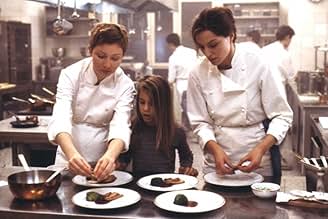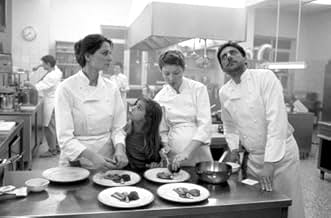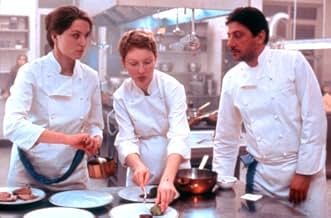IMDb-BEWERTUNG
7,2/10
8755
IHRE BEWERTUNG
Als eine eigenwillige Köchin sich um ihre ebenso sture 8-jährige Nichte kümmern muss, kochen die Spannungen zwischen ihnen hoch... bis ein italienischer Ersatzkoch für bessere Stimmung sorgt... Alles lesenAls eine eigenwillige Köchin sich um ihre ebenso sture 8-jährige Nichte kümmern muss, kochen die Spannungen zwischen ihnen hoch... bis ein italienischer Ersatzkoch für bessere Stimmung sorgt.Als eine eigenwillige Köchin sich um ihre ebenso sture 8-jährige Nichte kümmern muss, kochen die Spannungen zwischen ihnen hoch... bis ein italienischer Ersatzkoch für bessere Stimmung sorgt.
- Regie
- Drehbuch
- Hauptbesetzung
- Auszeichnungen
- 14 Gewinne & 7 Nominierungen insgesamt
Wolf-Dietrich Sprenger
- Lauter Gast
- (as W.D. Sprenger)
Victoria Trauttmansdorff
- Begleiterin
- (as Victoria von Trautmannsdorf)
Jerome Ducornau
- Jean
- (as Jerome Ducournau)
Empfohlene Bewertungen
8=G=
"Mostly Martha" is a thoroughly delightful tale of a comely, self contained, socially unassured, and occasionally gauche German master chef, Martha (Gedeck), in need of a recipe for living who finds love through tragedy and romance through cooking. In thinking about these comments I concluded that there is nothing I would change about this film except the language (I don't speak German). A perfect little gem, "Mostly Martha" is the kind of flick which makes you feel sorry for those who won't watch foreign films because of subtitles and wonder why audiences dine voraciously on cinematic junk food when such palate pleasers as this are not only delicious but nutritious. (A-)
The charms outweigh the clichés in "Mostly Martha (Bella Martha)." Of course it's right away different in that the phrase "German romantic comedy" isn't common and can be applied here.
I loved that "Martha" herself is a competent, self-possessed professional and that's what attracts the guy to her. While we first meet her in therapy, her problems are those of work and personal life I could certainly relate to.
While this will remind others of food prep movies like "Wedding Banquet," "Eat, Drink, Man, Woman," and "Tortilla Soup" or restaurant movies like "Dinner Rush" and "Big Night," (which all had male chefs), or "Babette's Feast," I have zero interest in cooking so cared only that "Martha" is very good at her job and at managing the restaurant kitchen.
The restaurant characters seem like real co-workers, and amazingly the niece is not some adorable child actor but seems like a real kid whose surliness is legit.
The Italian sous chef who comes on board brings the sensuality of the Mediterranean --in music (with a generous use of Paolo Conte songs), movement and language much like in the Danish "Italian for Beginners."
And of course in romance, which is still delightful even as the clichés start appearing, her happiness is indicated by her loosened hair like Jane Fonda's in "Electric Horseman."
But I enjoyed the build-up to their relationship in ever longer, longing glances and their mutual professional respect and concluding compromises.
(originally written 9/2/2002)
I loved that "Martha" herself is a competent, self-possessed professional and that's what attracts the guy to her. While we first meet her in therapy, her problems are those of work and personal life I could certainly relate to.
While this will remind others of food prep movies like "Wedding Banquet," "Eat, Drink, Man, Woman," and "Tortilla Soup" or restaurant movies like "Dinner Rush" and "Big Night," (which all had male chefs), or "Babette's Feast," I have zero interest in cooking so cared only that "Martha" is very good at her job and at managing the restaurant kitchen.
The restaurant characters seem like real co-workers, and amazingly the niece is not some adorable child actor but seems like a real kid whose surliness is legit.
The Italian sous chef who comes on board brings the sensuality of the Mediterranean --in music (with a generous use of Paolo Conte songs), movement and language much like in the Danish "Italian for Beginners."
And of course in romance, which is still delightful even as the clichés start appearing, her happiness is indicated by her loosened hair like Jane Fonda's in "Electric Horseman."
But I enjoyed the build-up to their relationship in ever longer, longing glances and their mutual professional respect and concluding compromises.
(originally written 9/2/2002)
A few rhetorical questions:
a. Why are there no great English-language food/romance movies? Whenever you see a movie that truly ravishes you with food preparation and recipes as part of the atmosphere of the movie, it comes from France or Mexico or Hong Kong - or, if it is in English, it's borrowed culturally from another country (e.g. Chocolat, or the Mexican-American adaptation of Ang Lee's Eat Drink Man Woman). I think it's because the English speaking societies of the world have a relatively unsophisticated approach to food preparation and dining, manifest in our great contributions to world culinary arts - fast food and industrial agriculture, plus cooking technologies that take art out of the equation. You can't have a sexy drama set amidst a world of force-fed veal or microwave dinners.
b. Why do we never talk about German comedy? The Germans do have a comedic tradition, but the movies that are released in the US tend to be solemn dramas, violent or shocking action pieces or grim experimental works. On the rare instances that I see a German comedy, I'm always pleasantly surprised, and I have the feeling I'm missing out.
c. Why are European movies so much better than American films at showing sexiness and desirability in 30- or 40-something year-old women? I have a pet theory, that European sensibilities about marriage and commitment are sufficiently different from American norms that there is the expectation that a 35-year old woman may yet be actively and happily single, or perhaps a single mom who isn't stigmatized to feel that she had best find some sucker to marry her and get out of the dating pool.
d. Why isn't jazz used in American soundtracks anymore? In this film set in Germany, the score is assembled by Manfred Eicher (founder of ECM, the acclaimed modern-jazz label), and it's all good. Some nice German lieder, classic vocal jazz, and instrumental pieces by Keith Jarrett and others. We Americans appear to have forgotten jazz as soundtrack music.
In any case, Mostly Martha is a fine little movie set in contemporary Köln, starring Martina Gedeck as the title character. Martha is a neurotic, workaholic chef at a high-end restaurant, whose control freak tendencies keep her at a distance from everyone. When her boss insists that she go to therapy, she replies by preparing recipes for the hapless shrink. Both lonely and a loner (a tricky combination), she throws herself into her work to the point of exhaustion.
Martha's single-minded life is thrown upside down when she suddenly becomes the guardian to her niece Lina (Maxime Foerste). As she struggles to take on this new role, the arrival of a competitor in the form of a brash Italian chef (Sergio Castellitto) threatens her supremacy in the kitchen.
Any viewer of romantic comedies knows where this is going, but I have no complaints about the plot line. The performances were all good; the dialogue is thoughtful; the food looks delicious. It's not a great movie, but it's a good one and would be an admirable effort by any studio.
a. Why are there no great English-language food/romance movies? Whenever you see a movie that truly ravishes you with food preparation and recipes as part of the atmosphere of the movie, it comes from France or Mexico or Hong Kong - or, if it is in English, it's borrowed culturally from another country (e.g. Chocolat, or the Mexican-American adaptation of Ang Lee's Eat Drink Man Woman). I think it's because the English speaking societies of the world have a relatively unsophisticated approach to food preparation and dining, manifest in our great contributions to world culinary arts - fast food and industrial agriculture, plus cooking technologies that take art out of the equation. You can't have a sexy drama set amidst a world of force-fed veal or microwave dinners.
b. Why do we never talk about German comedy? The Germans do have a comedic tradition, but the movies that are released in the US tend to be solemn dramas, violent or shocking action pieces or grim experimental works. On the rare instances that I see a German comedy, I'm always pleasantly surprised, and I have the feeling I'm missing out.
c. Why are European movies so much better than American films at showing sexiness and desirability in 30- or 40-something year-old women? I have a pet theory, that European sensibilities about marriage and commitment are sufficiently different from American norms that there is the expectation that a 35-year old woman may yet be actively and happily single, or perhaps a single mom who isn't stigmatized to feel that she had best find some sucker to marry her and get out of the dating pool.
d. Why isn't jazz used in American soundtracks anymore? In this film set in Germany, the score is assembled by Manfred Eicher (founder of ECM, the acclaimed modern-jazz label), and it's all good. Some nice German lieder, classic vocal jazz, and instrumental pieces by Keith Jarrett and others. We Americans appear to have forgotten jazz as soundtrack music.
In any case, Mostly Martha is a fine little movie set in contemporary Köln, starring Martina Gedeck as the title character. Martha is a neurotic, workaholic chef at a high-end restaurant, whose control freak tendencies keep her at a distance from everyone. When her boss insists that she go to therapy, she replies by preparing recipes for the hapless shrink. Both lonely and a loner (a tricky combination), she throws herself into her work to the point of exhaustion.
Martha's single-minded life is thrown upside down when she suddenly becomes the guardian to her niece Lina (Maxime Foerste). As she struggles to take on this new role, the arrival of a competitor in the form of a brash Italian chef (Sergio Castellitto) threatens her supremacy in the kitchen.
Any viewer of romantic comedies knows where this is going, but I have no complaints about the plot line. The performances were all good; the dialogue is thoughtful; the food looks delicious. It's not a great movie, but it's a good one and would be an admirable effort by any studio.
This German film is one of the happiest surprises of the year. Not only is it a well paced, acted, and directed, but it involves the viewer like no other film in recent memory. Director/writer Sandra Nettelbeck deserves praise for bringing this joyous piece to the screen.
Martina Gedleck, as Martha, is perfect as the control freak of the upscale restaurant. Obviously, she can cook, judging by the full houses and the good vibes she generates among the diners. What she has in smarts, she lacks in social graces. Obviously, she doesn't have a life.
Her world is shattered by the arrival of a niece that comes to her under tragic circumstances, and from Mario, the new Italian cook. One can see the new man in her kitchen is too much of a free spirit, who ultimately will be her downfall.
Mario, very nicely played by Sergio Castelletto, is the opposite of his German colleague. It doesn't take long for him to charm the daylights out of Martha. Sparks fly whenever they are on screen together. Both principals have the right chemistry and that's why this film works so well. It will surely disarm anyone in the right state of mind. The only thing is that one must leave the theatre craving for a great meal.
Martina Gedleck, as Martha, is perfect as the control freak of the upscale restaurant. Obviously, she can cook, judging by the full houses and the good vibes she generates among the diners. What she has in smarts, she lacks in social graces. Obviously, she doesn't have a life.
Her world is shattered by the arrival of a niece that comes to her under tragic circumstances, and from Mario, the new Italian cook. One can see the new man in her kitchen is too much of a free spirit, who ultimately will be her downfall.
Mario, very nicely played by Sergio Castelletto, is the opposite of his German colleague. It doesn't take long for him to charm the daylights out of Martha. Sparks fly whenever they are on screen together. Both principals have the right chemistry and that's why this film works so well. It will surely disarm anyone in the right state of mind. The only thing is that one must leave the theatre craving for a great meal.
A strange thing about the food: some of it, like the bird-cooked-in-pig's-bladder which Martha describes in loving detail in order to have something to talk about while she's with her therapist, sounds good, and perhaps even looks good, without being in the least bit appetising. You'd have to be mad to actually eat anything that's been cooked in a pig's bladder. But Martha is probably right aesthetically, if not in any other way: if she says the best way to cook the bird is in a pig's bladder, then you'd better believe it.
Martha is a superb creation. She's a good chef. (She may be the best chef of any film ever made.) When her boss sends her to a therapist, she talks about food and cooking, which interest her, rather than about herself, which doesn't interest her. She goes to therapy because her boss orders her to, and when her therapist (who's no fool either) asks her why she thinks her boss orders her to, she says, as though considering the question for the first time, that she doesn't know and she clearly doesn't care, either.
When various people (her orphaned niece, an Italian cook) come along to disrupt her life, we're on her side in wanting her to retain control; and although these likable people DO successfully disrupt her life, she does successfully retain control; so everyone wins. And it's hard not to admire someone who can not only insult the philistines who eat at the restaurant where she works but who know how to do so properly. These people don't know how good they have it. I'd rather be insulted by her than flattered by some spineless flunky.
The script, word for word, and moment for moment, is as perfectly judged as one of Martha's dishes. The IMDb user who says of Lina: "She didn't cry when her mother died, but she was really upset when Martha forgot to pick her up. It wasn't her fault, it was the script's" merely shows how much his sensibilities have been coarsened by Hollywood cliché. In fact, the film shows genuine insight into the way people naturally react, not the way lazy screenwriters would like to train them to react. Lina reacts to her mother's death not with the usual screen histrionics but by not eating. Tears are reserved (as they are in life) for less important misfortunes.
This is an assured, intelligent, charming film. Even the use of music shows an unerring touch. I'm eager to see what Sandra Nettelbeck does next.
Martha is a superb creation. She's a good chef. (She may be the best chef of any film ever made.) When her boss sends her to a therapist, she talks about food and cooking, which interest her, rather than about herself, which doesn't interest her. She goes to therapy because her boss orders her to, and when her therapist (who's no fool either) asks her why she thinks her boss orders her to, she says, as though considering the question for the first time, that she doesn't know and she clearly doesn't care, either.
When various people (her orphaned niece, an Italian cook) come along to disrupt her life, we're on her side in wanting her to retain control; and although these likable people DO successfully disrupt her life, she does successfully retain control; so everyone wins. And it's hard not to admire someone who can not only insult the philistines who eat at the restaurant where she works but who know how to do so properly. These people don't know how good they have it. I'd rather be insulted by her than flattered by some spineless flunky.
The script, word for word, and moment for moment, is as perfectly judged as one of Martha's dishes. The IMDb user who says of Lina: "She didn't cry when her mother died, but she was really upset when Martha forgot to pick her up. It wasn't her fault, it was the script's" merely shows how much his sensibilities have been coarsened by Hollywood cliché. In fact, the film shows genuine insight into the way people naturally react, not the way lazy screenwriters would like to train them to react. Lina reacts to her mother's death not with the usual screen histrionics but by not eating. Tears are reserved (as they are in life) for less important misfortunes.
This is an assured, intelligent, charming film. Even the use of music shows an unerring touch. I'm eager to see what Sandra Nettelbeck does next.
Wusstest du schon
- WissenswertesSergio Castellitto's German wasn't good enough so Frank Glaubrecht was brought in to dub his voice for the German version.
- PatzerWhen Mario and Lina get ready to cook dinner at Martha's apartment, Lina puts on her apron twice.
- VerbindungenFeatured in Das Kino bittet zu Tisch (2005)
- SoundtracksCountry
Written by Keith Jarrett
Performed by Keith Jarrett, Jan Garbarek, Palle Danielsson, Jørn Christensen
ECM Records
Top-Auswahl
Melde dich zum Bewerten an und greife auf die Watchlist für personalisierte Empfehlungen zu.
- How long is Mostly Martha?Powered by Alexa
Details
Box Office
- Bruttoertrag in den USA und Kanada
- 4.160.475 $
- Eröffnungswochenende in den USA und in Kanada
- 40.446 $
- 18. Aug. 2002
- Weltweiter Bruttoertrag
- 9.852.022 $
- Laufzeit
- 1 Std. 49 Min.(109 min)
- Farbe
- Sound-Mix
- Seitenverhältnis
- 1.85 : 1
Zu dieser Seite beitragen
Bearbeitung vorschlagen oder fehlenden Inhalt hinzufügen

![Trailer [OV] ansehen](https://m.media-amazon.com/images/M/MV5BYmI4MTFiNjAtNzg5ZC00Mjg2LWFhNDYtMTVhYjYyMTM3ZGM5XkEyXkFqcGdeQXRyYW5zY29kZS13b3JrZmxvdw@@._V1_QL75_UX500_CR0)















